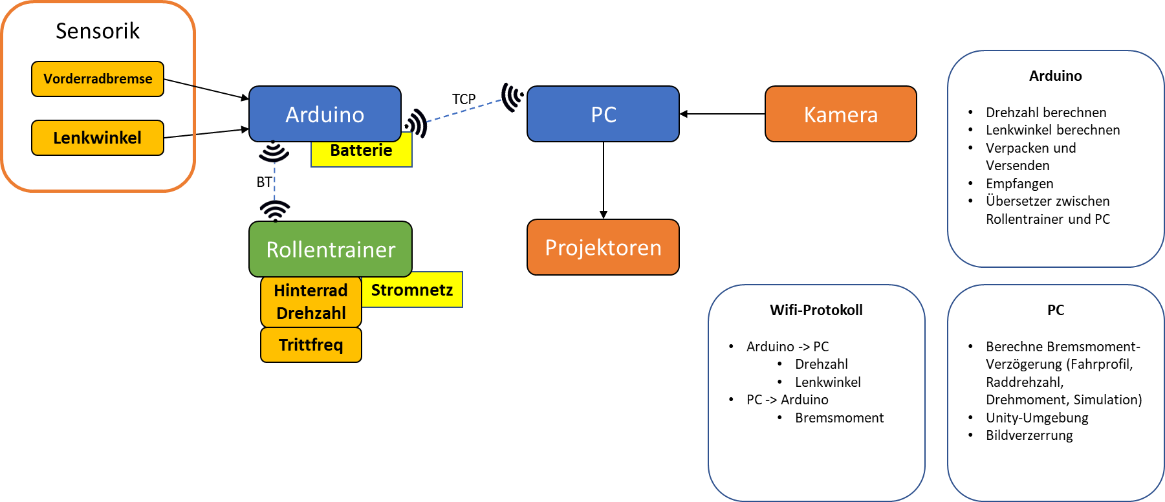![[Translate to English:] Viele Fahrräder unterwegs](/fileadmin/_processed_/f/9/csm_street-3373739_1280-pixabay_9bf86a1c69.jpg)
Sim-Bike
In addition to urbanisation, which is increasing the number of road users, the type of transport is also changing. Thus, there is an increasing reliance on emission-free means of transport such as the bicycle or e-scooters. To ensure that the various road users do not suffer painful encounters, the mobility simulator can be used to examine the behaviour of various road users, especially cyclists, in more detail. The simulator makes it possible to have test persons drive through a virtual world in different vehicles, which is displayed via a large screen. Through the connection to the game engine Unity 3D, it is possible to provoke any traffic situation without endangering the test person. These investigations are central to the evaluation of traffic concepts and the development of novel driving assistance systems in cars.
In cooperation with MMT and IUMS, a set-up is being created with which cycling can be simulated in a wide range of scenarios
Within the framework of this project, a simulator is to be set up that will give the test persons as realistic a driving experience as possible.
Realization
The virtual environment is projected onto a 2x6 metre screen stretched in a 180° arc. This gives the test persons the feeling of being immersed in the virtual world without possibly experiencing dizziness, as is often the case with VR glasses. The virtual environment is realised by the game engine Unity 3D. This game engine is also widely used in industry for the pre-development of autonomous driving assistance systems. In particular, the large number of prefabricated models and components are a great advantage of this platform. Work is currently also underway to integrate parts of the city of Karlsruhe into the simulation environment. A "sandbox" is also to be created on the basis of the mobility simulator, in which further project work can be brought together on the basis of Unity. For example, a lane departure warning system and a traffic simulation have already been developed.
External content
To use this content (Source: www.xyz.de), please click to Accept. We would like to point out that by accepting this iframes data to third parties transmitted or cookies could be stored.
You can find further information in our Privacy policy.
Video about the project, source: Paul Bäcker
Special attention is also being paid to investigating the behaviour of cyclists. As part of a project, a bicycle is therefore jacked up on a roller trainer and equipped with sensors for steering angle and speed. The read-in data is then transmitted to the simulation computer via a WLAN interface in order to control the virtual bicycle there. In order to be able to transfer the behaviour to real situations, the riding experience must be as authentic as possible. To achieve this, the driving resistances are first determined in the simulation, which then have an effect on the braking effect of the roller trainer.
Goals
In future projects at MMT, further forms of feedback to the rider are to be developed, for example the transmission of shocks caused by bumps or similar. In order to develop the most realistic driving behaviour possible for the simulated bicycle, an interface between Unity and Matlab-Simulink was created, which enables the simple adaptation of the dynamics model of the bicycle model.
Through the project, important insights into the behaviour of cyclists can be gained, which can support the development of many different concepts, from cycle paths, to AI-based recognition systems for autonomous vehicles.
The following work is planned, for the comprehensive extension of the Unity simulation environment:
- Work on the lane departure warning system
- Traffic simulation
- Semi-automated transfer of real roadways into Unity models
Key data
Karlsruhe
Institute of Energy Efficient Mobility (IEEM)
Moltkestr. 30
76133 Karlsruhe
Post >
Institute of Energy Efficient Mobility (IEEM)
Postfach 2440
76012 Karlsruhe

![[Translate to English:] Europaplatz der virtuellen Stadt Karlsruhe](/fileadmin/_processed_/8/7/csm_Virtuelle_Stadt_Karlsruhe2_2f545a4260.png)